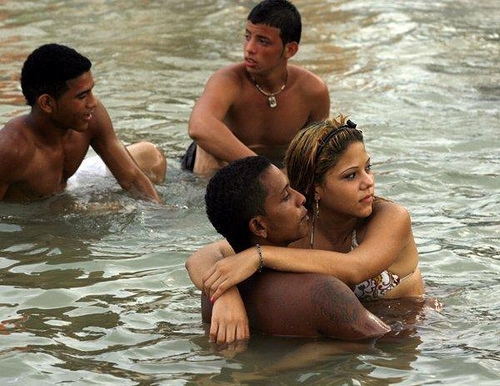CUBA: Racism Debated in Parliament

The Cuban parliament finally included the problem of racism, long a taboo issue in this country, in its debates this week. And the question is also on the agenda of the governing Communist Party's upcoming national conference.
The question of racial discrimination was debated in the education, culture, science and technology commission, in its meetings ahead of the year-end plenary session of parliament, held Friday.
'The inclusion of the racial issue on the parliamentary agenda was a long-standing demand of the Cofradía de la Negritud,' said Tato Quiñones, one of the activists involved in that citizen movement which emerged over a decade ago with the aim of raising awareness on discrimination based on skin colour in Cuba.
Quiñones told IPS that the Cofradía sees this as 'a first step on the long, arduous path that still lies ahead for Cuba with regard to this fundamental problem.'
The Cofradía regularly holds debates in which academics and researchers analyse the issue of racism from different angles.
It also launched nearly 50 proposals this year for actions to gradually wipe out discrimination on the basis of skin colour in Cuban society, and to reduce racial inequality, which the group says has grown in recent years.
The very first proposed action was for parliament to hold a hearing on the issue.
Esteban Morales, an Afro-Cuban economist and political scientist who is a leading researcher on race relations in Cuba, put special importance on 'the more explicit, public and, especially, institutional recognition of the racial question' since Fidel Castro addressed it in several of his speeches immediately following the 1959 triumph of the revolution.
'It's true that Fidel and Raúl (Castro) have raised the issue on several occasions,' Morales told IPS. 'But they were individual speeches, and aside from these exceptions, the official media denied the existence of the racial problem, which has been growing and can no longer be ignored on the political front.'
In his view, after 'having declared open war on corruption,' acknowledging racism would be one of the most important political steps to be taken by the government of Raúl Castro in the process of 'perfecting Cuban socialism.'
The fight against corruption is essential, he said, 'because it is the biggest threat to the efficient, credible management and functioning of the economy,' while tackling racism is also fundamental 'because it undermines social equality, our national and cultural identity, and national unity.'
Morales was expelled from the Communist Party in 2010 for writing two articles in which he warned about the serious risks of corruption, which he described as 'much more dangerous than the so-called internal dissident movement.' But his membership was reinstated about a year later.
The president of parliament, Ricardo Alarcón, culture minister Abel Prieto, the head of the Union of Cuban Writers and Artists (UNEAC) Miguel Barnet, and the president of the Book Institute Zuleika Romay took part in the legislative discussions on racial issues.
Also participating as a guest was Mariela Castro, the director of Cuba's National Sex Education Centre (CENESEX), who wrote in her personal blog on Thursday Dec. 22 that people in the meeting commented on the need for a law against all forms of discrimination.
But she said this legislation 'must also describe specific forms of discrimination.'
'If we do not carry out permanent educational and social communication strategies, like the ones we have been developing in CENESEX over the past few years with respect to the question of sexual orientation and gender identity, Cuban society will not be able to bring about the cultural changes needed to achieve real justice,' the sexologist said.
She also wrote that 'above and beyond penalising discrimination, we must carry out a broad labour of dialogue and participation in this complex process of transformation of our awareness.'
On that point she concurred with Alarcón, who said it was naïve to believe that racism could be overcome by laws or decrees.
By attempting to solve the problem through legal measures, 'we run the risk of contenting ourselves with that, as if the problem had been solved,' said Alarcón, according to a Cuban television report on the parliamentary debate, which are generally held behind closed doors.
But Barnet, the president of UNEAC, stressed that any act of discrimination, whether on racial, sexual orientation or gender grounds, must be punished, with the person fully identified.
In other words, there was no consensus on 'questions of a practical nature, with regard to the increasingly frequent expressions of discrimination,' Quiñones said.
The activist noted that racial discrimination is explicitly banned in the constitution. 'But that ban requires a complementary law to put it into effect. The issue has begun to be debated, and it has its detractors and proponents, and it's healthy for the debate to have gone up to the National Assembly,' he said.
In any case, there was agreement on the indispensable need for work on the cultural front, and for the government-controlled press to also help address the issue.
In addition, the participants in the debate said educational curricula must be revised, from the day care level up to university.
'Until we identify the need to fight for the dignity of persons, for respect for differences, for respect for each person's freedom to make their own decisions about how to live their lives…I think the progress we make will be limited,' Romay said.
The central document to be discussed at the Communist Party national conference, slated for late January, also proposes dealing with the issue of prejudice on the basis of racial questions, gender, religious belief, sexual orientation or any other kind of discrimination.
© Inter Press Service (2011) — All Rights Reserved. Original source: Inter Press Service

